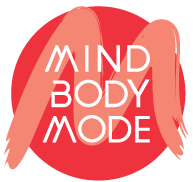Blog

You're never fully dressed without a smile!
Monday 8th January 2018
It sounds so simple, doesn't it? About as simple as keeping yourself sane and focused in January once the chaos and excitement of Christmas is over and the long, cold winter months loom ahead.
However, it can be simple. And the key focus here is simplicity. Don't over complicate surviving the winter months by setting unrealistic and complicated goals or resolutions. Instead, break down a survival guide into manageable and easy practices that will soon become your all-year-round survival guide.
To begin with, let's break it down into three areas: Mind, Body and Mode. Essentially, you need to nurture your body, calm your mind and put on your mode. Stay focused and this will soon become your daily mantra.
MIND
Mindfulness, breathe, value
To look after your mind and minimise the negative chatter that often fills our minds, often focusing on what we do not have, or a difficult aspect of our day, for example, there are three practices that I recommend to help silence the nagging doubts.
Mindfulness - The simple practice of being present in the moment. To begin, I recommend going for a walk and taking in your surroundings. As you focus on what you are seeing and sensing, breathing in smells, listening to sounds, you will find that your negative chatter is less prominent and you begin to take pleasure in the present moment. Do not worry if you find it hard to sustain, just keep bringing yourself back to your surroundings and how it is making you feel.
Breathe - Take a moment to monitor your breathing and make sure you are using your diaphragm, which is essential to increase the levels of oxygen in your body, vital for your health and your mind. Place your hand on your stomach area and if you are breathing deeply and correctly, you will feel your hand fall and rise. As you practice this, you will incidentally be in a mindful state as you are drawn into a present focus.
Value - Valuing who you are and what you have is not necessarily an easy practice but is certainly one you can develop. The first step is to stop comparing yourself to others. As you begin to explore this, you need to focus on what you have got and have achieved, noting that any mistakes or seeming disasters have been part of the journey which created the person you are and the place you are at in your life. Once you have established this and begin to value who you are, a more positive outlook will follow.
BODY
Water, exercise, sleep
Our bodies and minds are linked and if we are not fuelling our bodies correctly, our minds will be affected too. However, there are three simple steps I recommend before you rush into a new diet or unsustainable exercise regime.
Water - While following a healthy diet is essential for optimum health, I recommend one simple step to start you off - drink water. Our bodies are approximately 60% water and therefore water is an essential requirement to keep our bodies functioning, including our minds. Dehydration can lead to sluggish behaviour, headaches and irritability - all components of depression or anxiety.
Exercise - Before you rush out and join a gym or set yourself an unrealistic exercise regime, why not think about ways you can introduce exercise into your life to get you started, such as walking or taking the stairs instead of the lift. I also recommend joining an exercise or yoga class as both will also provide social camaraderie, which can also be a great motivator.
Sleep - Getting a good night's quality sleep is essential for your health and wellbeing. Recent research reveals how the blue light from screens, including TVs, can disrupt the ability to go to sleep and maintain a regular sleep pattern. My recommendation is to avoid all screens for at least an hour before bedtime and, instead, take a bath, read a book or listen to a guided meditation. As you develop your mindfulness practice, you will also find this a useful tool to help relax your body and mind.
MODE
Colour, pose, armour
What we wear and the way we present ourselves can say a lot about our emotions and can be viewed as non-verbal communication. There are three areas I recommend to help to boost your confidence and motivate a more positive outlook.
Colour - The colour you choose to wear can either express how you feel or what you want to achieve that day. For example, you may select a black jumper on a cold day because you feel the need for solitude, or you may select a bright orange jumper to lift your mood and embrace the day - this can be both a conscious or subconscious decision. My recommendation is to look at a colour palette and make a note of any feelings or reactions you have to certain colours. Any that evoke a positive and warm reaction could be the inspiring colours you need.
Pose - How you present yourself in terms of body language can make a huge difference to your outlook. Postulating, being conscious of your posture, can either give you an automatic sense of confidence or represent the desire to not be seen. I recommend practicing posture and body language techniques. A simple start is to feel the difference between standing tall with a smile on your face and then slouching into yourself with no expression. How do these poses make you feel? Hopefully, you feel an instant sense of happiness and confidence as you stand tall and smile.
Armour - Developing your own armour is really a combination of Mind, Body and Mode as you become conscious of your feelings, emotions and aspirations and begin to process both the positive and negative in your life, finding techniques and practices to deal with them. I recommend you explore your current emotional defences and ask yourself if they are really helping you. For example, do you ignore your partner and put up an invisible wall when they have upset you or do you put on your invisible emotional armour and confront the issue head on?
These simple steps will help you survive the January blues and beyond but remember, smiling is the best practice you can do and is also beautifully catching.
